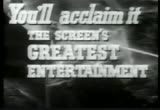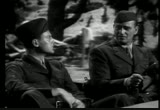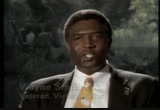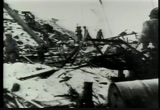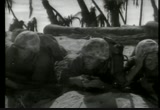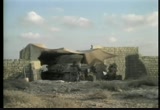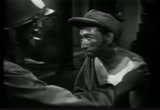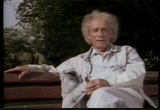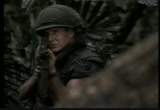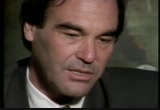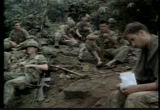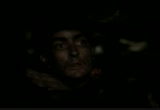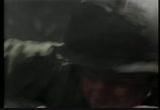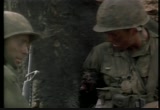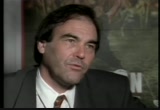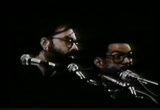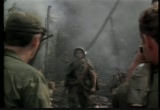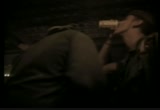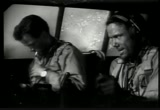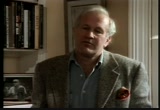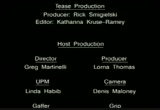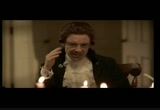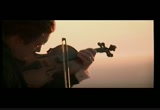tv Mosaic World News LINKTV October 2, 2012 7:30pm-8:00pm PDT
7:30 pm
(candidates groan) give me a hand with this pack. (sergeant frades) how about sergeant striker doin' that bunker assault. (candidates yell) well, your old movies like the ones about audie murphy and sergeant york, those were great movies. they're good patriotic movies. they don't -- they're not realistic. like john wayne movies weren't realistic as much, but they're very patriotic and they give you a sense of, "hey, you know, i want to go do that." (music playing) i'd come out of theater having seen some of these old films, movies like "pork chop hill" and "to hell and back" with audie murphy, "sands of iwo jima" with john wayne,
7:31 pm
i'd come out having -- feeling a peculiar thing. the peculiar thing was i wanted to play war. (tim o'brien) and i remember being with my little buddies, we'd go out to the golf course and pretend we were john wayne. (patriotic music playing) when you've got john wayne, you've already got history right there in front of you embodied in one character. he carries himself as a walking convention. (gene michaud) he's the older, wiser enlisted. he has to train young recruits and he has to be the father. if it's in the line of duty, i'll do what you tell me to do. but as far as my personal life, keep your hands off. that's the same thing your father would tell you. and i wouldn't have listened to him either. that's right. you never did. how do you know? he told me.
7:32 pm
wayne in "sands of iwo jima" is the great father figure, as always. he's the patriarch. he's going to teach this other generation how to be good marines and how to carry on. so he fulfills his work and they become good solid marines, the father figure can be slain because we know that the corps, the marine corps, is going to endure. well, conway, see, you made it. yeah, i guess that little voice was wrong. i feel better. i feel a lot better, too. as a matter of fact, never felt so good in my life. how about a cigarette? (gunshot) john wayne had great influence on me. john wayne is almost a cliche, indeed a cliche, for american representation of american macho. i think it's also ironic that john wayne never was in war. john wayne, of course, is a great hero. in the marine corps you see his picture in squad bays and in offices about as often as you see
7:33 pm
the pictures of some of the heroes of the corps. (tony lukeman) we even had a part of the c ration that we called the "john wayne cookie." (narrator) world war ii saw the advent of professional combat camera. for the first time audiences regularly viewed combat footage in the weekly movie newsreels. my first combat was tarowa in the pacific. (norm hatch) it was probably the first time there was a photo effort to provide the marine corps with training information on what actually happens in combat. sergeant hatch went in with the first wave on the landing at tarowa armed with a pistol and camera. brought back a film of the fighting on that island that looks like it was taken to a front-line gunfight.
7:34 pm
(norm hatch) i was lucky enough to get the only film of the enemy fighting against u.s. forces taken during the whole war. here's one of them. here's a squad of them. (norm hatch) i'm proud to say that that film of mine has been used probably in every film on the pacific made. (dramatic music playing) i'd like to know where the rest of the squad went. what's this? (machine gun firing) whatever it is, it ain't healthy! let's get outta here! (thomas doherty) because so many americans knew the second world war
7:35 pm
not in a full combat experience -- they'd certainly seen newsreels and combat reports of the time. that was a close one! they would no longer accept a backlot rendering of the war. so there is a movement toward what you'd call verisimilitude in the post-war era. (thomas doherty) these films often incorporate some newsreel footage. (gunfire and explosions) (leonard fribourg) i received orders to report to the studios. they'd made arrangements with the marine corps to get all the footage out here that they could look at that had been taken during combat in world war ii. we watched the film 5 to 7 hours a day. they were looking for combat and for things that were real that they could use in the movie. (explosion)
7:36 pm
(dramatic music playing) (whistling of bomb) (explosion) now, the closest i could think of making a real war movie is to have a couple of riflemen behind the screen and during a firefight on the screen. people in the audience aren't killed, but are wounded. (sam fuller) that's the only way i can see makin' a legitimate war movie. (explosions) (narrator) many people felt combat footage revealed the reality of war, but some combat veterans thought differently. when sam fuller made a film about the korean war,
7:37 pm
he questioned the moral clarity of a ww ii victory parade. americans' mixed feelings about race and foreign policy were shown for the first time uncensored by the o.w.i. we tend to think of the '50s as an era of eisenhower or golf but in reality the '50s was fraught with tensions. take the racial tension we see brought out to the fore in "the steel helmet" in a way it's not brought out in something like "bataan." i just don't understand you. you can't eat with 'em unless there's a war. then, it's difficult. isn't that so? that's right. you'll pay for a ticket, but sit in the back of a bus. isn't that so? that's right.
7:38 pm
a hundred years ago i couldn't even ride a bus. at least now i can sit in the back. maybe in 50 years, sit in the middle. someday even up front. there's some things you just can't rush, buster. you're a stupid man. you're the stupid joe. why don't ya' get wise, buster? (ripping sound) the commies loved it, loved it, it was in "the daily worker" and "people's world." up until a certain part of the picture. then i have these -- then they said this picture was financed by mcarthur. (gunfire) it's a good thing this army isn't made of fat-headed slobs like you that think this war is run by idiots!
7:39 pm
just because those little rats kill our prisoners, that's no reason to do the same thing. no matter how sentimental or personal you get, you're supposed to be in the united states infantry! soldier! you're no soldier! you're just a big, dumb, stupid selfish, fat-headed sergeant! and if it takes me 20 years, i'll see that you're shot for killin' a prisoner of war. understand? sew him up! give him blood! are you kiddin'? blew a hole in him as big as a tunnel! i can drive a truck through it. ah! (thomas doherty) the critical reaction in "the steel helmet" was by and large confused. the film was complicated and doesn't lend itself to a simplistic sort of interpretation. the film raises many unpleasant and incongruent elements in the american character. anybody in there? (thomas doherty) if we have moral unity in the second world war, as remembered in "sands of iwo jima" in '49,
7:40 pm
we have more equivocation and disillusionment in "the steel helmet." what's your outfit, soldier? (thomas doherty) where we see the increasing disintegration of the american memory and experience of war. say, what kind of an outfit is this? u.s. infantry. where's your officer? by the time we get to "platoon" the american platoon is not fighting the enemy; they're fighting each other. (announcer) vietnam veterans disagree on whether this shows the war exactly as they fought it, but most agree it has a profound effect. it's a pretty devastating film. it really is. it really touched the personal side of it.
7:41 pm
for vets, be ready for it. good afternoon, candidates, i'm captain vickers, leadership office here at officer candidate school. get cha' in the afternoon, get cha' during the death hour. to get us goin' this afternoon i'm going to show you a little bit of a film clip that's gonna give you an idea of everything that's wrong when you talk about a unit and professionalism and ethics we expect them to demonstrate. lights out. (yelling in vietnamese) (gunshot) (baby sobbing)
7:42 pm
gives you an uneasy feeling, doesn't it? think about that's a depiction of u.s. armed forces personnel. i had problems with depictions of the americans being the great aggressor and antagonist, and it's not so. unfortunately, that clip showed the military in an unfavorable light, but, by the same token, a realistic military version and what its function is can help the military itself and the american public understand its military and what it's there for. it's not there to be john wayne. this is the problem the vietnam generation has in going into vietnam. that is, they apply hollywood frames of reference that they were brought up on in the 1940's and 50's to the new experience and it doesn't fit. (yelling back and forth in vietnamese)
7:43 pm
barnes! barnes! what the f--- do you think you're doin'?! stay out of this, elias. this ain't your show. you ain't a firing squad, you piece of s---! (yelling commotion) my motivation was to remember before it was forgotten. people died and i remembered them very well and i remember growing up in the war and it was a rite of passage i wanted to -- like the man said, i wanted to remember a time when people did this. i did not want that to be forgotten. (oliver stone) i served september of '67 to december of '68 in cambodia.
7:44 pm
then i was wounded twice and got out of the combat. i got into a court-martial situation with a sergeant. most of them were a---, in my opinion. they never went to combat and never were in the field. there was a lot of resentment, obviously, and i think that comes out in "hamburger hill." i think there's that -- a lot of resentment, but a reluctant patriotism, i suppose. (john irvin) the people i've talked to didn't have an option. obviously, it was possible to evade the draft. the people i met didn't have the means or will. it's from my girlfriend. (john irvin) or even believe that it was right to. says she's not gonna write anymore. friends at college told her it was immoral to write to me.
7:45 pm
oh. there were those of us who thought the war was wrong, but felt in many ways as though we had no choice other than to do what our duty was. (popping sound of guns) i was faced in "platoon" with a jungle hard to see in. you, therefore, have to take the liberty of moving the enemy a little closer so that you can see. often, you never saw the enemy but you'll feel 'em. (vietcong talking in the distance) (explosion) get outta the bunker! they're gonna blow it! we did a lot of jiggly stuff to try to approximate the sense of not knowing where it's coming from
7:46 pm
or what you're shooting at, very documentary, with a long lens panning fast and shooting from position to position approximating point of view, changing radically each moment. (screams and explosions) war is mostly boredom, long periods of boredom, then punctuated by terrifying madness and surrealism. (gunfire and cursing) oh, god! (gunfire) jeez! (gunfire) (john irvin) apart from the fetter feeling and the great sympathy i had for the men who were fighting that war,
7:47 pm
the biggest influence on me was the photography of burrows. (clicking of camera) the camera is close to the ground. it tends to be behind the protagonists. in other words, it tends to be where it would be in reality. having been a documentary filmmaker, i try and put it in a safe place, where it would be if it were live ammunition. sir! what? your arm. oh. the vietnam film is impossible to understand unless you have all this other background about the world war ii film and the post-war celebration of world war ii on-screen. that hollywood feels complicit that it has told americans
7:48 pm
about war throughout the 40's, 50's, and 1960's. so when hollywood comes to make the vietnam cycle, they have to say, "forget everything we told you in those previous 30 years of war films. war is really something that is horrible and deadly and it can have no moral meaning." go! (man) go ahead. go ahead, nicky. (man) just do it! do it! (man) go ahead! (click) (laughter) (oliver stone) i wrote "platoon" in 1976, before the "apocalypse now" and "deerhunter" came out. those films, i view them as mythic movies, wonderfully made, crafted, sergio leone kind of epics, but for me, they don't show the war i knew. (oliver stone) there's a fundamental irrealism about them.
7:49 pm
"apocalypse" is more joseph conrad, had nothing to do with the war that most infantrymen knew. we were having to find units, dealing with daily attrition and survival. that movie exists for me as a mythic view of vietnam. ♪ come on, baby ♪ take a chance ♪ (thunder crashes) ♪ come on, baby ♪ take a chance ♪ my film is not a movie. my film is not about vietnam. it is vietnam. (francis ford coppola) we made it very much like how americans were in vietnam. we were in the jungle.
7:50 pm
there were too many of us and, little by little, we went insane. (man) they trained young men about violent people, but their commanders won't allow them to write f---. when francis ford copolla stands up at "the cannes" with his hands outstretched and says, "i am vietnam," is really like zanuck saying, "i want to be the whole wwii." i think jim carabuctus wrote a very honest, a very direct version of the vietnam experience. okay. let's get ready. let's tape this squad. teddy ford, may 17th. how long have you been on this hill, soldier? what? hey, brother, how many times you been up and down this hill? what are you doin' here? my job. bull.
7:51 pm
up and down this hill nine f--- times. hey, word is you guys can't take this hill. what do you have to say about that? in fact, senator kennedy says you guys don't have a chance. in vietnam, something, perhaps the fear of death, we african-americans, in particular, and young white guys especially who were more hip, who were not necessarily lifers could relate to one another and develop a sense of love that is so remarkable and if i were to say anything was lost for me, to this day i grieve, it was that.%/ ♪ people say ♪ i'm the life of the party ♪ 'cuz i tell ♪ a joke or two ♪ although i might ♪ be laughin' -- ♪ (thomas doherty) beginning with world war ii, certainly throughout the '50s
7:52 pm
and through the vietnam cycle, one thing combat film shows is the american dream of equality and justice. ♪ you see the smile ♪ looks out of place ♪ if you look closer ♪ it's easy to trace ♪ the tracks ♪ of my tears ♪ (explosions) mayday! mayday! i'm goin' in. to h--- with you. i got control. (thomas doherty) the contradictions that we see in the films is the contradictions we see in combat itself, an experience that is at once so horrifying and so glorious. (siren) tommy, get rid of your sight. you and buck go out through the bomb bay. get goin'! i'll use the escape hatch. go on! they'll have to drag the bottom of the ocean to get this. open your escape hatch. i'll throw it out. (thomas doherty) during the second world war, our memory of it, and hollywood's presentation emphasizes other qualities.
7:53 pm
go on! get out! (thomas doherty) like at the end of "bataan" when the machine gun sprays the enemy and the character is dying, but his death is glorious. and more importantly than glory is the moral meaning of that. we know the sacrifice has a payoff. (playing sad music) what's so terrifying about the vietnam experience on film is that we see the death of these characters that we care about knowing it has no moral payoff. i would like to see spike lee or a black filmmaker make a film about vietnam. and until that is done, there's going to be a void in the vietnam genre.
7:55 pm
7:56 pm
270 Views
Uploaded by TV Archive on

 Live Music Archive
Live Music Archive Librivox Free Audio
Librivox Free Audio Metropolitan Museum
Metropolitan Museum Cleveland Museum of Art
Cleveland Museum of Art Internet Arcade
Internet Arcade Console Living Room
Console Living Room Open Library
Open Library American Libraries
American Libraries TV News
TV News Understanding 9/11
Understanding 9/11
